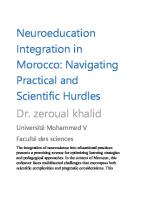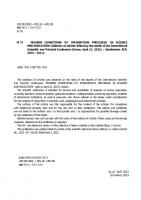Neuroeducation Integration in Morocco Navigating Practical and Scientific Hurdles
140 35 373KB
English Pages [7]
Recommend Papers

- Author / Uploaded
- Dr. zeroual khalid
File loading please wait...
Citation preview
Neuroeducation Integration in Morocco: Navigating Practical and Scientific Hurdles Dr. zeroual khalid Université Mohammed V Faculté des sciences The integration of neuroscience into educational practices presents a promising avenue for optimizing learning strategies and pedagogical approaches. In the context of Morocco, this endeavor faces multifaceted challenges that encompass both scientific complexities and pragmatic considerations. This
abstract examines the hurdles encountered in bridging education and neuroscience in Morocco. Scientifically, the gap between neuroscience research and its translation into effective teaching methodologies poses a significant challenge. Additionally, the need for interdisciplinary collaboration between educators, neuroscientists, and policymakers remains imperative but demanding. Furthermore, navigating cultural nuances and contextualizing findings to suit the diverse Moroccan educational landscape stands as a pragmatic obstacle. Despite these challenges, the prospects are promising. With concerted efforts in research, professional development, and policy reforms, Morocco can harness the potential of neuroeducation to revolutionize its educational framework and enhance learning outcomes for its diverse student population.
Fundamentals of Neuroeducation This section provides an indepth exploration of the foundational principles of neuroeducation, elucidating the ways in which discoveries from neuroscience intersect with pedagogical methodologies. We delve into the neuroscience behind learning processes, memory formation, attention, and other cognitive functions. By illustrating these neural logic, it establishes the scientific basis for the potential enhancements in educational practices. Key Neuroscientific Findings Relevant to Teaching and Learning Here, the chapter highlights pivotal discoveries from neuroscience research that directly impact teaching and learning strategies. It focuses on findings related to neuroplasticity, cognitive development, the impact of stress on learning, and the role of emotions in education. Special emphasis is placed on identifying neuroscientific insights that can be translated into actionable methods to optimize learning outcomes in Moroccan educational settings. Challenges in Neuroscience to Moroccan Education This section addresses the challenges inherent in applying complex neuroscientific concepts within the framework of Moroccan education. It discusses the barriers to integrating neuroscientific findings into the curriculum, teacher training programs, and classroom practices. Factors such as resource limitations, varying educational contexts, and the need for specialized expertise are analyzed, shedding light on the
complexities of implementing neuroscientific principles in a diverse educational landscape. Strategies for Practical Application Building upon the identified challenges, this section proposes strategies tailored to the Moroccan educational system. We give ways to bridge the gap between neuroscience and education by advocating for targeted teacher training, curriculum adaptation, and the development of evidence-based teaching methodologies aligned with neuroscientific insights. Collaborative efforts among educators, neuroscientists, and policymakers are emphasized as essential for successful implementation. We aim to provide a comprehensive understanding of how neuroscience intersects with education, highlighting both the promises and challenges of integrating neuroscientific knowledge into the Moroccan educational context. It aims to offer actionable insights for educators, policymakers, and researchers seeking to leverage neuroscience to enhance teaching and learning practices in Morocco.
Challenges in Curriculum Development This section assesses the hurdles encountered when infusing neuroscientific insights into the Moroccan curriculum. Challenges include the alignment of neuroscience findings with existing educational standards, adapting content for diverse student populations, and ensuring that the curriculum remains current amidst rapidly evolving scientific discoveries. Bridging Neuroscience and Pedagogy Here, We evaluate the challenges in providing adequate training to educators on integrating neuroscientific principles into teaching methodologies. It addresses the need for specialized professional development programs, potential resistance to adopting new methods, and the accessibility of neurosciencerelated training for educators in various regions of Morocco. Implementing Neuroscientific Approaches in Classrooms. We give the practical hurdles faced when implementing neuroscientifically informed strategies in Moroccan classrooms. Challenges include limited resources, classroom size, cultural considerations, and the translation of complex scientific concepts into age-appropriate and culturally relevant teaching practices. Strategies and Best Practices Drawing on successful examples and insights from neuroeducation initiatives globally, this text outlines potential strategies for the Moroccan context. It proposes collaborative initiatives between educational institutions and neuroscience research centers, the development of localized teaching resources that bridge neuroscience and pedagogy, and the establishment of professional networks
fostering ongoing support and exchange among educators, neuroscientists, and policymakers. Importance of Collaboration and Policy Support Emphasizing the significance of collective efforts, this section underscores the need for collaboration among educators, neuroscientists, and policymakers. It advocates for the formulation of supportive policies that incentivize the integration of neuroscience into education, encourage interdisciplinary research, and allocate resources for sustainable implementation. By examining these challenges and proposing targeted The integration of neuroscientific insights into Moroccan educational institutions represents a promising yet challenging endeavour. It became evident that while neuroscience offers invaluable insights into optimizing teaching and learning, several hurdles impede its seamless integration into the Moroccan educational landscape. The challenges span various dimensions, from aligning curriculum with evolving neuroscience findings to providing adequate teacher training and effectively implementing neuroscientific strategies in classrooms. Additionally, resource limitations, cultural considerations, and the complexities of the intricate scientific concepts into practical pedagogical methods pose substantial obstacles. However, despite these challenges, the prospects for leveraging neuroscience in education in Morocco remain optimistic. Strategies and best practices for the Moroccan context were identified, emphasizing collaborative partnerships between educators, neuroscientists, and policymakers. The importance of localized resources, ongoing professional development, and supportive policies emerged as pivotal elements for successful
integration. The key takeaway is the crucial role of collaboration and interdisciplinary exchange. The synergy between educators, neuroscientists, and policymakers is fundamental in bridging the gap between neuroscience and education. Encouraging this collaboration, fostering ongoing dialogue, and establishing supportive policies are essential for sustainable implementation and continuous improvement. As Morocco navigates the complexities of integrating neuroscientific insights into education, a concerted effort from all stakeholders is paramount. By addressing these challenges collectively and implementing targeted strategies, Moroccan educational institutions can harness the potential of neuroscience to revolutionize teaching methodologies, personalize learning experiences, and ultimately enhance educational outcomes for all students. This journey toward integrating neuroscience into education is an ongoing process, and its success hinges on sustained commitment, collaboration, and adaptability within the educational landscape of Morocco.









